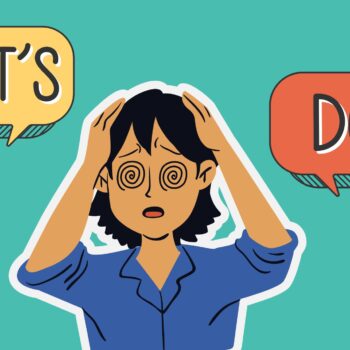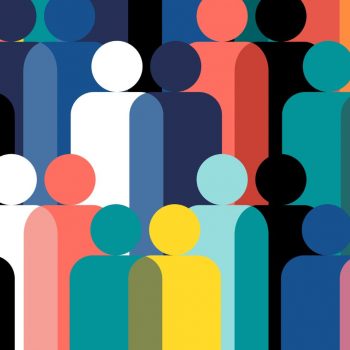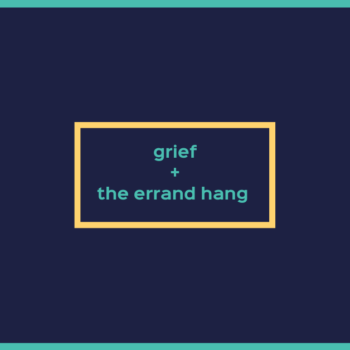Embracing the Strength of Weak Ties
/ Supporting a Griever : Litsa
While strong ties, like our relationships with close friends and family, are a critical part of emotional support, recent research sheds light on why I'm probably not weird for looking to a barista for an emotional boost. Historically most people (and researchers) have underestimated the power of "weak ties" in our mental well-being. But my personal experience (and academic research, which you may take more seriously) shows us that leaning into these weak ties can be a simple and unexpected support in dark times.
Research Insights: the Benefits of Weak Ties
In a 1973 paper, Mark Granovetter introduced the term "weak ties". His interest was focused on weak ties as relationships that were meaningful because he believed they expanded employment mobility. He was interested in labor markets (imagine how your "contacts" might help you get a job. Grranovetter suggested weak ties were more beneficial in those functions than close connections. Since then, researchers like Gillian Sandstrom and Elizabeth Dunn have delved deeper into the dynamics of these casual connections. Importantly, their interest turned away from economic exchange and focused instead on mental well-being.
Sandstrom had a personal experience in graduate school of walking past a hot dog vendor every day and saying hello. Reflecting on how comforting this tiny, daily interaction with a stranger was, she began studying this phenomenon. She found that these soft connections were associated with increased well-being and a greater sense of belonging. She and Dunn found that older adults who engaged in more frequent interactions with weak ties experienced greater positive emotions, lower rates of depression, and a heightened sense of belonging. That was true independent of personality factors like extroversion.
Soft Connections
As a quick aside, I have to say that I don't love the term "weak ties". In the 1970s, when Granovetter coined the phrase, he was studying social network models. He suggested that in sociology these models had always studied strong connections between people (strong ties). He thought, however, that when we focus on weaker connections, we see how different groups are connected. We can analyze parts of social structure that aren't clearly defined by close-knit circles. I get it that in that context, 'weak ties' was the logical term. But something about the phrase feels cold and technical to me. Especially as more research has emerged about the value of these relationships and their role in mental well-being.
I told my partner about the 'weak ties' research a while back. Several weeks later he brought it up, but couldn't remember the phrase "weak ties". He referred to them as "soft connections", a phrase that immediately resonated with my experience of these relationships. I say all this because I'm going to use these terms interchangeably from here on out. You should find whatever phrase works for you.
Grieving and Weak Ties
While the importance of weak ties in mental health is widely acknowledged, their significance becomes even more pronounced in grief. While grieving, people frequently experience a sense of disconnection from themselves. They withdraw socially. It's not unusual to feel distant from their close relationships (for various reasons).
During such times, weak ties can serve as a lifeline. They provide a sense of normalcy and connection to the outside world. These tiny, casual interactions can offer moments of respite from the heaviness of grief. My bad-day visit to the coffee shop is a chance for a chat with someone familiar, but who doesn't carry the weight of stronger tie relationships. We don't have the same expectations of weak ties and they don't have the same expectations of us.
Importantly, weak ties can also bring new insights and connections around grief, which can feel helpful and refreshing. In some instances, these folks don't even know about our losses. You might really appreciate that they don't look at you like the kid whose mom died, or the mom whose kid died, or the new widow. In other situations, they might share a perspective or resource you knew nothing about. Their insights and connections are different from our own closer social circles in ways that can prove helpful.
Defining Weak Ties
But what exactly are weak ties? They're relationships that involve lower emotional intensity and limited intimacy - think casual acquaintances. And like most things, weak ties exist on a spectrum. It can be people like neighbors or coworkers - who you know, but not well. Or it can be someone in the checkout line at the store who you've never met before, but with whom you create a connection.
These connections carry benefits that we rarely think about. Of course, there is the comfort of familiarity - a wave from the mail carrier can be surprisingly meaningful on a low day. But the research has found much more than that. Soft connections offer novelty. They provide fresh perspectives, access to new information, and resources beyond what is available in our immediate social circle (unsurprisingly, our strong ties are more likely to be people similar to us).
The Power of Tiny Interactions
During times of grief, you may find solace in the simplicity of interactions with weak ties. Whether it's a friendly exchange with a grocery store cashier or a brief conversation with a colleague you don't know well at work. While the support of strong ties remains invaluable, weak ties provide a different kind of comfort—a gentle reminder that we are part of a community bigger than our immediate circle. Embracing these soft connections has been found to buffer against stress and loneliness and is linked to improved cognitive functioning and reduced mortality risk.
As weak tie researchers point out, "a hairdresser might lend a listening ear as you talk about how you are coping after the death of your spouse. A colleague down the hall who also had a miscarriage might be able to point you to a support group or tell you about support available from the workplace. A neighbour might walk your dog when you need to take your Mum to a doctor's appointment".
A review of the literature found one study in which acquaintances were cited almost as often as friends as sources of support. Another study found that 65% of people with cancer could recall specific instances of weak tie relationships offering help with their cancer. Additionally, studies found that when people are self-conscious about their difficulties, they actually often prefer weak-tie support. This was especially true for young people, young males, and in stigmatizing situations. Theorists looking at the distance people feel in weak tie relationships suggest that they reduce fears of judgment and increase perceptions of objectivity.
Weak Ties Doubt Themselves
Despite research that weak ties offer us support in many ways, people tend to dismiss these relationships and their value. As a griever, you might minimize the boost in mood or the connection, support, and information you can get from soft connections. As a weak tie in someone else's life, you might have anxieties about everything from saying hello to offering support.
A 2022 study found that people’s expectations about how their support will be received determines their likelihood to offer support. This is bad enough, as the study found most people underestimate how helpful their support will be, even in their strong relationships. But this was even pronounced in distant relationships. Participants believed they would feel awkward and less competent the more distant their relationship. This likely makes weak ties even more apprehensive about whether to offer helpful interaction to others.
We Need Weak Ties and Stong Ties
Now, it's important to realize that this article is not your invitation to ignore strong-tie relationships. We just wanted to give you a reason to pause and value those weak-tie relationships. Remind yourself that a visit to the local library or coffee shop sometimes offers you more than just a book or a coffee. While weak ties offer often overlooked benefits, they aren't a replacement for the support provided by strong ties. A balanced social network in life and grief is comprised of varying relationships.
Cultivating a diverse social network is key. But as you navigate the complexities grief in day-to-day life, don't underestimate the power of a friendly exchange. A brief conversation may be just the glimmer you need.
Tips to Foster Soft Connections
- Become a regular, not just by going to the same places (library, grocery store, gas station, coffee shop, wherever!), but by going at the same times. At places where people work similar shifts week-to-week, this can often allow you to build familiarity more quickly.
- Be open to spontaneous interactions. It could be small talk with the person next to you at a conference, in line at the grocery store, or a neighbor. Chance encounters can lead to surprising connections and, unfortunately, our phones often keep us in our own bubbles. Take advantage of these moments when they arise!
- Say hi to strangers, especially those you see often but don't know like neighbors, the postman, or people you see at the gym, library, church, or other places you frequent. If you worry it is weird or awkward, try to remind yourself that there is a well-documented loneliness epidemic going on - many people appreciate a casual hello.
- If you're still worried you're not skilled at talking with strangers or people you don't know well, remind yourself that a little practice goes a long way! Research found that people who talked to one new person every day for 5 days reported feeling progressively more competent and less nervous. That isn't much practice to get the benefits.

We invite you to share your experiences, questions, and resource suggestions with the WYG community in the discussion section below.
We wrote a book!
After writing online articles for What’s Your Grief
for over a decade, we finally wrote a tangible,
real-life book!
What’s Your Grief? Lists to Help you Through Any Loss is for people experiencing any type of loss. This book discusses some of the most common grief experiences and breaks down psychological concepts to help you understand your thoughts and emotions. It also shares useful coping tools, and helps the reader reflect on their unique relationship with grief and loss.
You can find What’s Your Grief? Lists to Help you Through Any Loss wherever you buy books:





Green Kiwi March 28, 2024 at 11:21 am
This is so very pertinent to me as I greive the 4th year anniversaries that marked the dying and then death of my father during the first covid lockdown in the UK. The isolation that I and my mother felt whislt we first cared for him and then subsequently tried to find a new normal after he died is still very accute. Due to the requirements for bubbles, isolation, mask wearing, we didn’t have access to those ‘weak’ ties, as well as being de facto outside of being included in others’ bubbles as we had been necessarily isolated as we were at home carers. The impact on those of us who lost loved ones during the lockdowns is still accute and I’m still accutely aware of how my grief has manifested. I find myself most at comfort now on my own. Our grief processes have been so drastically torn apart. Please could WYG delve into this more?
Jessica Cabness, PhD, LCSW-C March 15, 2024 at 11:15 am
I confess I had NEVER thought about the socioemotional value of relatively unimportant, distal social relationships. It turns out that these supposed weak ties bring unexpected benefits, like social support, especially in times of grief. Thank you for sharing this insight and research supporting it.
In full transparency, I strive to view all human interaction as hidden opportunities for deeper cinnection. We never know what we will learn from someone else, nor what we bring to the interaction will help another person. Although I read The Celestine Prophecy decades ago, my take-away is that we all bring something to social intersctions–whether to give or to receive. Now, I’m glad to be able to apply a name:to this social phenomenon: Weak ties.
Marcia Frank March 14, 2024 at 9:18 pm
I love how spot on and timely these articles are. My husband passed away 1 year ago, Feb. 25th, 2023. I haven’t lived alone since I was in my 20s and I just turned 69. I am relearning myself and learning to live alone. I have experienced the warm after effects of soft connections but didn’t realize it had a name. I have lost family and friends since my husband passed, some of my doing, some not, but I don’t regret any of those “loses.” I’m still learning how to do “widowed.” I used to be pretty social, not now. Solitude is peaceful.
Thank you for what you do.
Marcia
Mandee March 14, 2024 at 11:40 am
I appreciate this article, but was hoping to also get some insight into grieving those weak tie relationships.
Joan March 14, 2024 at 11:25 am
So sorry for your loss.
Carrie Tonini March 13, 2024 at 10:36 am
Buried my two adult sons in August 2022.
Had been driving for Uber for seven years at the time.
Couldn’t drive for 5 months. Too heartbroken.
Finally started again a few hours at a time.
Hugely important getting me back out with people again.
I understand the value of weak ties but have found many of my past strong ties have abandoned me over the last year. Very hard for me to deal with. Loss on top of loss.
TaraC March 14, 2024 at 5:48 pm
Oh Carrie, my heart goes out to you.
Julie March 12, 2024 at 6:33 pm
This is helpful in understanding my attraction to those weaker ties. Thank you. I would also like to point out that for stronger ties, one walks the slippery slope depending on the relationship. After my grief journey began, I found that I could no longer relate to some of the people who I thought were part of my inner circle. Death highlighted for me so much and made me grow in my discernment. These people could not relate to me either and so, we have had strained relationships. I not only seek out weaker ties, but NEW ties who have no connection to that time in my life. Thanks for all your work!
Alejandra Vazquez-Arevalo March 12, 2024 at 3:25 pm
The article about weak ties or soft connections is great, this give me the opportunity to understand why I love so much going to McDonald’s everyday.
Actually every evening I love to drive to McDonald’s for my coffee, usually the cashier is the same person and we have a small talk.
Now I understand why I founded so attractive, was not the coffee itself was the interaction the soft connection I have with the cashier lady.
Thanks for this enlightening.
Bob Wiggins March 12, 2024 at 2:07 pm
I’ve been doing this for several years since my Mom passed and later lost my job It’s been very tough on me not having any other family, and few friends that I can count on. I make regular visits to a WAWA or Bagel shop, even though it would be cheaper to make coffee at home. I see familiar faces and they seem to remember me. I feel better knowing I’m not the only person that does this.
Kathryn Holden March 12, 2024 at 12:52 pm
I couldn’t agree more and your article puts words to what I was yearning for. During a bad health episode years ago I “ made” my self go to my local coffee spot almost daily just to see other people and chat with the baristas for a moment. It made a huge impact, and now that I am grieving the loss of my husband, and previously my child, I was thinking just today of where I can start going regularly. Superficial, loose, low-risk connections are all I can tolerate right now, and that is just fine.
Jean March 12, 2024 at 12:05 pm
This is so true about weak ties. I rely on it cuz sometimes you just can’t rely on talking about old stuff with friends and family too much. Also showing interest in other people’s life is good…you never know what they are going through. Weak ties can be a small part of your social life when you are lonely. Love these articles…so real
Saul March 12, 2024 at 11:07 am
My wife passed away three years ago and the grief is easier but will never go away
Yes Iits true going to coffee shops restaurants work etc where people know or get to know you helps everyday go by, I now visit smaller coffee shops and restaurants where the owners and servers know me compared to the larger expensive places Bev and I used to go to
Very very close friends understand where as most say three years is is long enough , time to move on
So funny as people at work are opposite as they tell me as well as others there is a ma. Who was really in love with his wife
Times change and so do friends as I now see some of those people from work as my friends have moved on since I’m still alone
Thanks for the article as I had some doubts about myself
Saul
Jan March 12, 2024 at 10:19 am
I’d heard of the research on weak ties. As I started reading your post, I thought “That’s mostly true for extroverts.” It’s so interesting, then, that the benefits of weak ties hold true independent of personality factors like extroversion. Hmmm.
I think the benefits depend largely on the content of your interactions with weak ties. It is certainly nice to see familiar faces at the coffee shop, the gym, the dog park. But for me, I suffered a devastating breakup with a man I expected to spend my life with – his personality changed abruptly, and the man who had adored me was never seen again. I actually wondered if he’d had a breakdown. After the first couple months post-breakup, when I tried to talk to people, I often I got responses on the level of “Men are like busses, there’s always another one coming along.” I realize it’s hard for people to know what to say. But this tone-deaf response made my loss even more painful. Gradually I stopped having personal conversations with most people. I’ve seen friends go through something similar, in different situations – a woman with severe post-partum depression had her plight trivialized by her friends. Another friend whose mother was dying had friends say “I’m sure your mom will be OK” when clearly she was at death’s door. Yes, superficial conversations with various people can help, but I’ve found that trying to have genuine conversations about my heartbreak, with most people, just isn’t worth it. It helps me to know that I’m not the only one to receive a lack of empathy. Apparently, it’s wide spread.
monica wood March 12, 2024 at 10:17 am
Very Helpful reading
Nancy March 12, 2024 at 9:19 am
When I lost my son to an accidental overdose I could ONLY find comfort in such brief connections. I could not trust or didn’t want to accept support of family and friends who had not been supportive during his struggle ( and mine) people in my closer circle felt entitled to judge advise etc. It is a lonely grief and that loneliness has often been temporarily relieved by the pure “un- tarnished” kindness of strangers. I see now I’m not the only one who has had this experience.
Sarah Powell March 12, 2024 at 8:59 am
As a new widow I appreciate your putting a name to ‘weak ties’ in your blog. I volunteered to be a listening ear for people whose spouses are undergoing terminal cancer treatment, and now realize that what these people and I developed were weak ties, which helped us both.
Carm March 12, 2024 at 8:55 am
Excellent article! Gives value to those relationships that do have a meaningful purpose in our lives.
Gilles Nault March 12, 2024 at 8:18 am
There is safety in “weak” connections. Weak connections are less likely to let “you” down. They are family or friends that said that they would be there for you after you time of loss has occurred. The family and friends oftentimes feel “enough time has passed” and slowly drift away but the pain of grief does not. You are left wondering why have they abandoned me or why have they left me feeling abandoned. The weak connections come into our lives as places of safety because they momentarily “friendly”, yes they are paid to be friendly essentially but they are little drops of friendliness that oftentimes lacks in our lives. And they can’t disappoint or hurt if they are slightly outside our buffer zone of safety. We don’t fully let them in except in a way that we feel safe and that is how they won’t disappoint us or further break our hearts, what’s left of them. The weak ties in our lives are sometimes one of the few things that help keep us alive still.
Ursula March 14, 2024 at 10:37 am
My husband of 60 years died three years ago and I still cry when our anniversary and birthdays come. I so appreciate soft connections and I now try to respond to grieving widows the same way. I meet them everday, so many. I haven’t stayed connected to old friends because of all the questions. I belong to a zoom grief share group and that is my comfortable place.
I met my husband at age 17 and he was my only love and best friend. I still feel lost.🙏
Carm March 14, 2024 at 11:40 am
Even though I met my a bit later in college, he too was the only person I dated and was married to.
It has been 10 yrs this past February and I still remember all significant dates, anniversaries, songs, etc.
I my first 2024 cardinal and they still make me think of him.
My life is different now but it still includes David!
Carm March 14, 2024 at 11:46 am
I lost my two best friends a few year after my husband passed. I’d say part of it was the time since his passing (2014), part was trying to be those close by bffs again after living apart for 15 or so years, and part was how very needy I was (although I didn’t realize it at the time). It still hurts at times and I don’t know why the ties weren’t strong enough. But I have made peace with it for the most part.
And yes the weak ties help!
Grace Grant March 12, 2024 at 7:50 am
That is such a coincidence s as in have been thinking among those lines just this past week.
I grew up in a city but have lived in a rural area for the last 20 years.
My adult, life loving, marathon running, son died from a brain tumour in Jan 23 , seven months after diagnosis. I still find my grief unbearable a lot of the time
However I have noticed recently that going back to a town and observing or passing the time of day with strangers can be very helpful in allowing you to see that life is still going on, even though for you it can feel that it has stopped.
I find this much harder in the countryside, lack of human contact makes me feel depressed even when surrounded by the beauty of nature.
It’s much harder to summon up the energy to go for a walk there than in a town with coffee shops and parks where I can feel a human connection.
So it’s comforting to know I’m not weird after all, and others find that too.
TaraC March 12, 2024 at 7:47 am
The article about weak ties was very enlightening to me, especially the part about having a coffee every morning and joking with the baristas. I have done this instinctively almost every day since I lost my husband but I didn’t know there is actually a name for it.
Jane March 12, 2024 at 7:39 am
Years ago I went to the same coffee shop for my large hazelnut, 2 sweet and low, and milk. I became such a regular, that even when I walked in behind a dozen others (Motor Vehicles was next door!), they would hold up my coffee above their heads and wave me to the front. My letter carrier became friends with my dog and me. I knew when she was coming as my dog would get really excited. Then the day all pet owners dread was when she had to be put to sleep. I had 14 wonderful, loving years with her. My letter carrier knocked on my door one day with a sympathy card from her and from my coffee shop staff. I will always remember the kindness and strength of these ‘weak ties’. It helped me in ways they probably never knew.